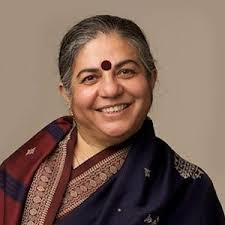
Vandana Shiva
Indian Environmentalist and Activist
For 40 years I’ve been trying to build a movement that makes us recognise that we are part of the Earth, not its owners and conquerors. Above all are the rights of Earth. Since the earth is a living subject, she is Gaia, she is our mother; a violation of the earth is a very serious violation. We already know that the majority of ecosystems are at the verge of collapse. So ecocide is a crime and I fully support the campaign to declare ecocide as a crime.
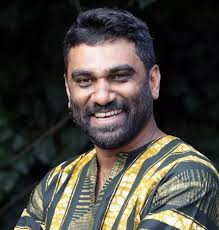
Kumi Naidoo
Executive Director Greenpeace International
Currently, we allow our political and business leaders to get aware with murder. Now iis the time to change that. We need direct liability for those who are destroying our future and this planet. We need fast, profound and systemic change. History only moves forward when courageous people get up and act. That’s why I support this citizen’s initiative to recognise ecocide as the crime it is.

Vivienne Westwood
English Fashion Designer
Our financial rulers and the politicians who help them are playing a giant game of Monopoly with the world’s finite resources – completely abstract from reality – even though they accept the facts of Climate change. And yet, you can’t play Monopoly when everybody’s dead. They imagine they’ll be the last people. They don’t care so long as they win.
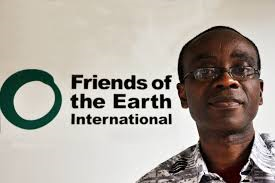
Nnimmo Bassey
Former Chair of Friends of the Earth International
I fully believe in this cause .Making ecocide a recognised law will place a cap on the irresponsible actions of fat cats who hide behind corporate shields to destroy lives and harm the planet. Polluting nations and corporations are engaging in acts of aggression against nature and against humanity. These are extreme acts of mass destruction that may affect the planet in cataclysmic ways. These acts must be recognised for what they are and duly punished. This Ecocide law may be the only way to make climate criminals rethink their crimes of commission and omission.

Niko Paech
Apl. Professor Dr, University of Oldenburg
The initiative to outlaw ecological destruction as a major crime is a cause I can only support. This is not only about the protection of the environment anymore but about the preservation of the natural capital without which we can’t provide for ourselves. This affects particularly people in Africa, Asia and Latin America. For – as a consequence of the destruction of European natural habitats – we are increasingly using the landscapes of other continents, for example through land grabbing. We sack them and take away the basis of food production for those living there.

Polly Higgins
Barrister, International Lawyer, Author (1968-2019)
It was back in 2010 that the United Nations first receive the draft amendment for a law of Ecocide to be included in the Rome Statute. Since then some much has come to light. But there is more than that, here is a law that can effect great change in our lifetimes and in the lives of many more to come. There is missing law here and over the past 4 years academics, lawyers, ministers, ambassadors, students, mothers, fathers, teachers, farmers in short anyone who cares about the Earth today – are all supporting Ecocide Law. Not least of all, the many volunteers who are taking out to the wider world an idea whose time has come. The European Citizen’s Initiative has paved the way for something greater to emerge. Whilst there may be a diversity of voices on the detail, the common unifying intent is the same; to end the era of Ecocide.

Dr Sandor Fulop
Former Parliamentary Commissioner for future generations in Hungary
It was back in 2010 that the United Nations first receive the draft amendment for a law of Ecocide to be included in the Amidst the global system of imminent environmental catastrophes there is a clear recognition by the scientific community of the threats that the system of ecological disasters poses to the recent civilisation of humankind. This urges us to harness all the available and possible legal and institutional tools, including criminal law. Similar to the set of problems we try to cope with, our responses should be systematic. Therefore, criminal law tools shall form a part of a network of legal and institutional responses, actually a last resort kind of response to the most severe infringement of the values and interests of the concerned communities. The network shall encompass the system of administrative environmental measures and the relevant institutions too, especially those laws and institutions that are able to abandon the short sighted ‘here and now’ attitude of our recent social and political world. Institutions representing future generations usually try to apply the whole range of the available legal tools in order to enforce the solutions for the present ecological disputes in a way that is tolerable from the view-points of the future generations too. Their encounters with the Crime against Ecocide needs further scrutiny.
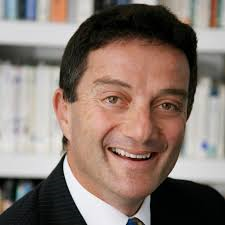
Professor Steven Freeland
Professor of International Law, Co-Director of Research and HDR School of Law, University of Western Sydney
Humankind has for far too long regarded the environment only of as secondary importance when engaged in other activities involving trade and commerce, industrial development and the conduct of armed conflict. Those existing laws that have been codified and which may be relevant are generally either too compromised in their terms or have not been respected for lack of effective sanctions. Many members of civil society, academics, NGOs and parliamentarians are now working towards rectifying this situation and the work of the European Citizen’s Initiative to ‘End Ecocide in Europe’ represents an important part of this process and should be supported in every possible way.
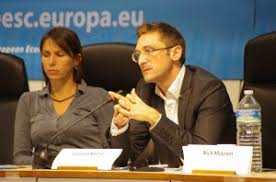
Professor Laurent Neyret
University of Versailles Saint-Quinten
The consecration of an international crime of ecocide falling under criminal law, international right and right of the environment implies before everything else the implementation of a strict methodology of work. Realistic and efficient means to punish environmental crimes are to be considered. To achieve this, several questions must be addressed, amongst them especially how to define the crime of Ecocide? Which legal strategy should we take to recognize; between national rights, transnational rights and supranational rights? Which jurisdiction should be relevant to judge such a crime?

Jan van de Venis
President Stand Up for Your Rights and Legal Desk Director Waterlex
Climate change litigation, Environmental justice, Ecocide. A human rights based approach. Crowdfunding for justice or growding. All relatively recent ways of looking at legal solutions to stop the degradation of our planet. Is there one silver bullet? Is Ecocide just that? I do not think so. The concept of Ecocide is part of the cocktail of solutions.
Ecocide can be seen as a crime against humanity, a crime against peace. But also as a crime against our planet. Against our home. Against the nature that we are part of. Making someone ill with intent or negligence is a crime. The same for our planet – that indeed must be recognised. The new legal ways of approaching environmental degradation are not silver bullets on their own but together they are big drops, buckets full, currents in a stream, river, and ocean currents. And they together can surely be part of the tidal wave of justice that we all long for.
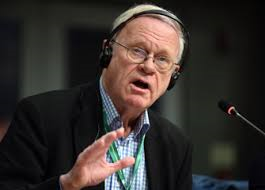
Wouter Veening
Chairman of the Institute for Environmental Security
Climate change and its impacts on food, water, energy, shelter and security and on the condition of the oceans, waste dumping, overfishing, wildlife poaching and trafficking wiping out specifies, deforestation by illegal logging, drilling for oil and gas in shale layers, tar sands. Arctic waters, smuggling of ozone-depleting substances threaten the survival of man and nature both directly and by undermining peace and stability. Going on with these activities either knowing what the effects are or, if not, not applying the precautionary principle is/should/will be considered a crime against humanity and the community of life in general.
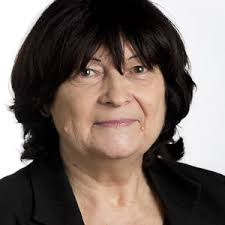
Marie-Odile Bertella-Geffroy
Judge, Vice President Paris Regional Court
Human health is severely affected by the deterioration of global ecosystems that sustain life in the planet; the consequence is the considerable increase of existing and emergency of new diseases affecting populations. The big difficulty lies in the fact that links between environment and health are often indirect, displaced in space, delayed in time, and multifactorial; we might call them global health catastrophes with low noise. Criminal justice is the only one able to determine the causes and to identify the responsibilities of collective infringement of health and human life, especially environmental, whether national, European or international and this, to punish industrial managers, multinational companies and governments and especially to prevent new disasters. International justice is the only way to harmonize the search for causes and responsibilities with the aim of prevention in mind. To call this criminal infringement of the fundamental right to health and human life ‘ecocide’ whether perpetrated in a deliberate way or neglecting the risks or humans is a big step towards the establishment of an international justice, and the only way to present and future environmental health disasters. Ecocide = Kill life; let’s protect it!
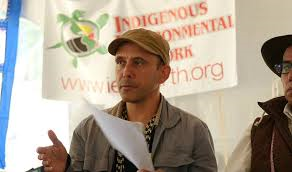
Gert-Peter Bruch
Planete Amazone
All over the planet, the final natural environments, vital organs of the global climate and indigenous people who occupy them continue to be sacrificed on the altar of the all sacrosanct ‘development’. Today industrial projects dubbed by governments have ben come weapons of mass destruction. It is a war indeed, and indigenous peoples have in Brazil or elsewhere, no really effective weapon to defend themselves. Nature either. But both of them are nevertheless essential to us. The indigenous peoples are not only the guardians of the last preserved environments and thus of the global climate but they also hold valuable knowledge that we cannot let them destroy. No one should be able to validate a decision involving the possible disappearance of cultures, languages and spirituality and secular medicine without being accountable for it before all of humanity.
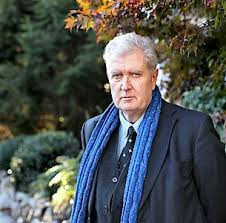
Dr Jim Skelly
Director Baker Institute for Peace and Conflict Studies, Juniata College
We cannot continue the wanton violation of Nature! The campaign to End Ecocide and make it a ‘Crime Against International Peace’ is an initiative every right thinking person should join!

Mark Gray
Canadian-Australian lawyer, author of the ‘International Crime of Ecocide’ (1994)
Thirty years ago, I proposed a definition of ecocide based on existing international human rights and environmental law, to help develop the concept of acceptance as an international crime. I am therefore delighted to see it taken up today by End Ecocide in Earth. I believe this legal foundation, if applied to transboundary action or neglect of sufficient magnitude or consequence and which is wasteful and unnecessary for human survival can form the basis of a new international crime.

Leida Rijnhout
Director for Global Policies and Sustainability at European Environmental Bureau (EEB)
One of the important results form an international programme on Environmental Justice, Liabilities and Trade is the interactive online Atlas of Environmental Justice. The main goal of developing such an atlas is to show the amount of environmental conflicts in the world, the facts and figures of them, and the stories of struggle and victories behind. It is a result of hard work from 23 partners in 18 countries. ‘End Ecocide’ is an interested angle to urge accountability form companies and governments for the huge damage they cause with their activities and/or policies.

Femke Wijdekop
Campaign Associate, Stop Ecocide Netherlands
Femke is an Earth Lawyer at the Institute for Environmental Security. She received her LL.M in International Law from the Free University (Amsterdam) in 2003. After graduating she worked at the University of Amsterdam for 4 years doing research in the fields of International Law and Constitutional Law which included a research visit to the Freie Universitat Berlin in 2006. From January 2013 on-wards, Femke started volunteering with the End Ecocide in Europe campaign and Polly Higgins’ global campaign to Eradicate Ecocide. She organised an Earth Guardian workshop with Polly Higgins in Amsterdam in the summer of 2013 and joined the ‘Integrative Law Movement’ spearheaded by J. Kim Wright. In 2020 Femke joined the international campaign Stop Ecocide Netherlands as Campaign Associate.